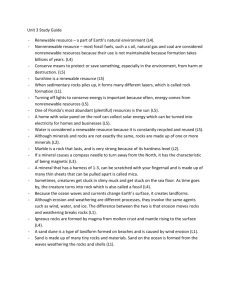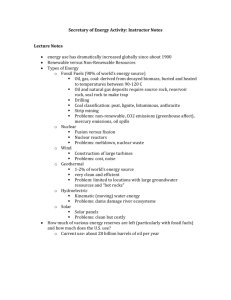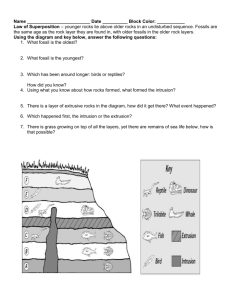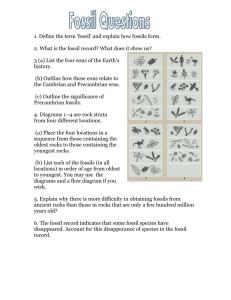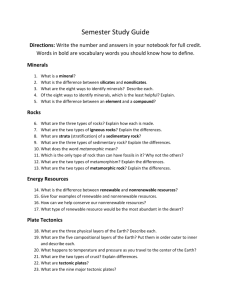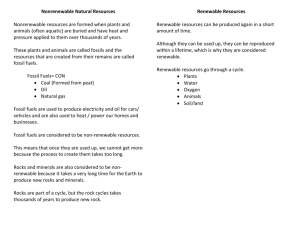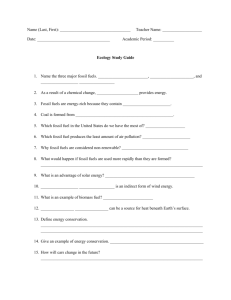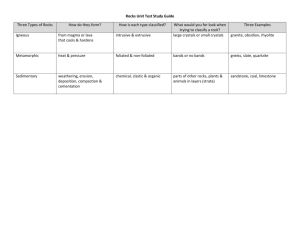LESSON 10 TEKS: 3.7D, 4.7C, 5.1B, 5.7A Nonrenewable
advertisement
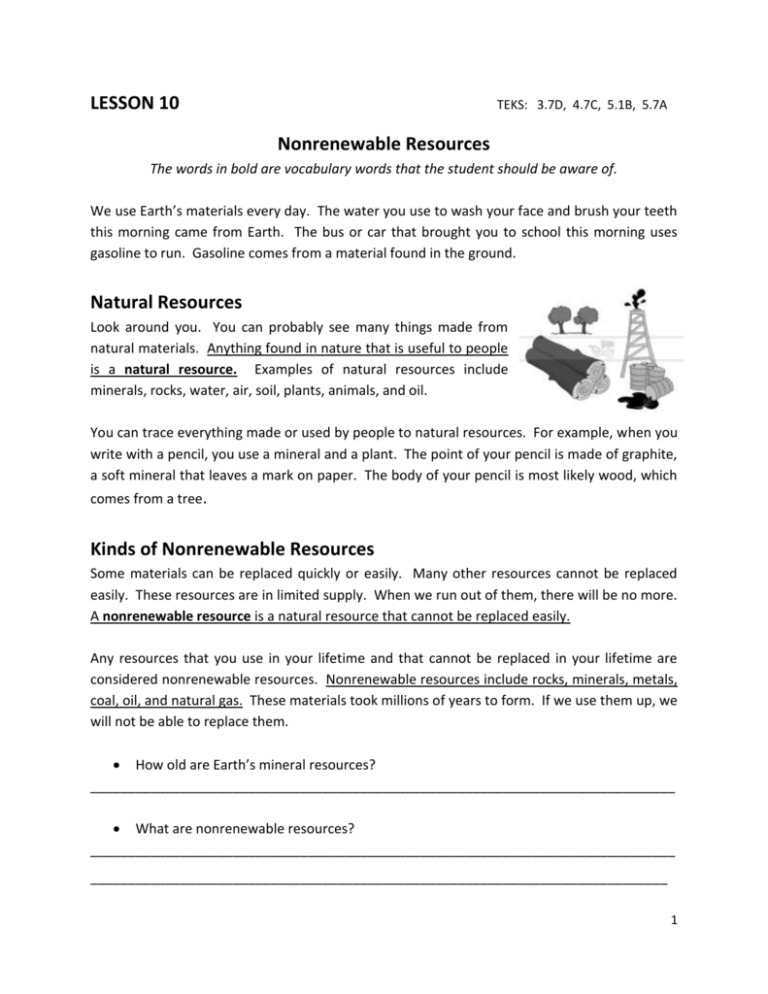
LESSON 10 TEKS: 3.7D, 4.7C, 5.1B, 5.7A Nonrenewable Resources The words in bold are vocabulary words that the student should be aware of. We use Earth’s materials every day. The water you use to wash your face and brush your teeth this morning came from Earth. The bus or car that brought you to school this morning uses gasoline to run. Gasoline comes from a material found in the ground. Natural Resources Look around you. You can probably see many things made from natural materials. Anything found in nature that is useful to people is a natural resource. Examples of natural resources include minerals, rocks, water, air, soil, plants, animals, and oil. You can trace everything made or used by people to natural resources. For example, when you write with a pencil, you use a mineral and a plant. The point of your pencil is made of graphite, a soft mineral that leaves a mark on paper. The body of your pencil is most likely wood, which comes from a tree. Kinds of Nonrenewable Resources Some materials can be replaced quickly or easily. Many other resources cannot be replaced easily. These resources are in limited supply. When we run out of them, there will be no more. A nonrenewable resource is a natural resource that cannot be replaced easily. Any resources that you use in your lifetime and that cannot be replaced in your lifetime are considered nonrenewable resources. Nonrenewable resources include rocks, minerals, metals, coal, oil, and natural gas. These materials took millions of years to form. If we use them up, we will not be able to replace them. How old are Earth’s mineral resources? ______________________________________________________________________________ What are nonrenewable resources? ______________________________________________________________________________ _____________________________________________________________________________ 1 Rocks Rocks are materials found in the ground, and minerals make up rocks. Scientists classify rocks according to how they formed. Igneous Rocks Deep underground, temperatures are high enough to melt rocks. Melted rock is called magma. When magma cools, it hardens to form rock. Magma that flows out of the ground onto Earth’s surface is called lava. Above ground, the lava cools and hardens. Rocks that formed from cooled magma or lava are called igneous rocks. Granite is an example of an igneous rock. Sedimentary Rocks Sediments are bits of rock, shells, and the remains of plants and animals. Over millions of years, sediments are buried under ground. Sediments that are pressed and cemented together form sedimentary rocks. Limestone is a sedimentary rock. Metamorphic Rocks Forces within Earth’s crust can change igneous rocks and sedimentary rocks into metamorphic rocks. Metamorphic rocks are formed from existing rocks that have been squeezed and heated deep inside Earth’s crust. Marble is a metamorphic rock made from limestone that has been squeezed and heated deep inside Earth’s crust. Many rocks contain useful metals. People use rocks, minerals, and metals in many ways. Rocks such as granite, limestone, marble, and slate are used to make building blocks, countertops, statues, and floors. Quartz is a mineral used to make glass. Talc is a mineral used to make baby powder. Rocks and minerals also make up soil, which is used to grow plants for food. Aluminum, copper, and iron are metals. Aluminum is used to make wire, cans, and car parts. Copper is used to make wire and jewelry. Iron is used to make steel for cars, ships, and buildings. What kind of rock is formed from magma? ______________________________________________________________________________ What kind of rock is formed from sediments? ______________________________________________________________________________ 2 Fossil Fuels Coal, oil, and natural gas are known as fossil fuels. Fossil fuels are energy resources that formed from the remains of plants and animals that died millions of years ago. Coal formed from the remains of plants that lived in ancient swamps. After the plants died, they became buried under layers of water and sediment. Over millions of years, pressure and heat turned the plant remains into coal. How Coal Formed 300 million years ago 100 million years ago Today 3 Oil and natural gas formed in much the same way, but they were formed from the remains of tiny organisms that lived in the ocean. Because it took so long for these fossil fuels to form, they are nonrenewable resources. People burn fossil fuels to get energy. Car and truck engines burn gasoline, which is made from oil. Power plants burn coal to produce electricity. People burn oil and natural gas in furnaces to heat their homes. Oil is also used to make plastics. How are fossil fuels formed? ___________________________________________________________________ ______________________________________________________________ About how long does it take fossil fuels to form? ______________________________________________________________ ______________________________________________________________ 4 Conserving Nonrenewable Resources It is important to conserve nonrenewable resources. To conserve something means to use it wisely to avoid using it up. Recycling is one way to conserve resources. Recycling means processing used materials to make new products. Many metal cans are made of aluminum. Used cans can be recycled to make new aluminum products. Another way to save resources is to reuse products. You can wash a plastic cup and use it again, instead of throwing it away. Reusing the cup saves oil that would be used to make new plastic. Fossil fuels can be conserved if we use less. You can reduce the use of fossil fuels in your own home. If we use less electricity, we conserve the fuel burned at the power plant. Even simple things like turning off the lights when you leave a room can help. In the summer, set the air conditioner to a higher room temperature. You can be comfortable without making the room extremely cold. When you feel chilly during the cooler months of the year, you can put on a sweater instead of turning up the thermostat. Then the furnace in your home will burn less oil or natural gas. People can save gasoline by driving less and by using cars that use less gasoline. Planning errands so that they can be done in one trip instead of several trips saves fuel. Walking or riding a bike for short distances saves fuel, too. Another way to conserve fossil fuel is to use sources of energy that do not depend on burning fossil fuel. What does recycling mean? ___________________________________________________________________________ List 2 ways that we can conserve or reduce the amount of fossil fuel that we use ______________________________________________________________________________ ______________________________________________________________________________ 5 QUESTIONS 1. Which one is a natural resource? A. B. C. D. Rock Bridge Wire Car 2. A rock such as granite is a A. Fossil fuel B. Recycled material C. Nonrenewable resource D. Metal 3. Which activity helps conserve natural resources? A. Building houses B. Making plastic C. Driving cars less D. Turning lights on 4. Which of these is burned to produce electricity? A. B. C. D. Coal Aluminum Iron Copper 5. Which formed from the remains of tiny organisms that lived in the ocean millions of years ago? A. B. C. D. Copper Natural gas Coal Granite 6. Which of the following is NOT a fossil fuel? A. Coal B. Oil C. Sunlight D. Natural gas 6

